Customs
Editorial! The incursion of Chinese into Nigeria’s revenue vault.

The ubiquitous Chinese is gradually getting a foothold in the nation’s economy.
On May 30th, 2022, the controversial concession of the Nigeria Customs Service was consummated at the national headquarters of the service in Abuja.
Despite the outcry of stakeholders against the concession of the operations of the Nigeria Customs Service, the Federal Government signed a tripartite concession agreement with a Chinese company, Huawei Technologies, and their Nigerian counterparts, Trade Modernisation Project Limited with Africa Finance Corporation as the lead financiers.
The agreement was facilitated and midwifed by the Infrastructure Concession Regulatory Commission(ICRC).
The concessionaires, under the agreement, will drive the modernisation project for 20 years.
Last Monday’s consummation of the concession agreement was preceded by the approval granted by the Federal Government in September 2020 to concede the operations of the customs to concessionaires
The concession agreement, which spans a period of 20 years, will involve the modernisation of the processes and procedures of the Nigeria Customs Service, including its revenue generation which the concessionaires will take over through which they are to recoup their $3.2 billion investments.
Expectedly, the decision of the Federal government, which was clinically executed in the mould of a coup d’é tat, caught many industry stakeholders pants down.
It also generated animated discussion as the approval and eventual concession was granted in defiance to the popular wish of the operators.
Since 2019, when the industry got wind of this concession deal before the 2020 approval, there has been concerted opposition mounted by the aghast operators who felt the move was an attempt to give away our common patrimony to the foreign interests.
Then, Hon. Jerry Alagbaso, a former Customs chief and erstwhile member of the House of Representatives, rallied the National Assembly against the move.
But to the chagrin of everyone, the Federal government pulled a fast one on all the antagonists of the project.
We are less disconcerted over this concession deal which we believe was willing away the nation’s cash cow for 20 years to the foreign imperialists and their local collaborators.
We are at a loss on which powerful forces could have forced the hands of the Federal government to enter into this type of deal against the popular counsel of knowledgeable stakeholders.
Modernisation of Customs, they said.
What is there to modernise in the processes and procedures of the Nigeria Customs Service?
At the risk of being controverted, we dare say the Nigeria Customs has the most advanced form of automation process among the government agencies in the industry and one of the most automated in Africa.
The Secretary-General of the African Continental Free Trade Area (AfCFTA), Wamkele Mene said as much when he visited Apapa Customs command last week.
Mr. Mene said Nigeria Customs has the most advanced and comprehensive automation programme among its peers in Africa.
The only challenge which the service has is human.
Some of the men and officers of the service are clearly aversed to full automation due to their selfish and pecuniary interests.
The automation process will eliminate human contacts which is the avenue for extortion and exploitation.
Since 2003, Nigeria Customs has gone through a series of automation processes that have made its processes and procedures seamless.
The Automated System for Customs Data (ASYCUDA) and its advanced form of ASYCUDA+, ASYCUDA++, the Nigeria Customs Integrated System (NCIS1 &11), and Pre-Arrival Assessment Report (PAAR) are some of the automation platforms created by the customs management over the years to make customs operations seamless.
Even, in 2013, the Service developed a web-based application to provide information and guidelines for international trade business processors, export and transit trade which is called Nigeria trade Portal which is interactive.
To our mind, what the service needs is to upgrade these automated platforms, and integrate them with other players in the cargo documentation and clearance chains under the neglected single window project.
With adequate capital outlay, we believe Nigeria Customs can achieve full automation status without the involvement of foreign economic imperialists, aided and abetted by their avaricious local collaborators.
The anti- automation officers, who are averred to technology due to their selfish interests, could be reformed.
If they are adamant, they could be shipped out.
Cargo scanning could be emphasised while physical examination of cargoes could be sparingly used.
With these and all other automation platforms well integrated into the single-window under the supervision of a willing Customs administration, the Nigeria Customs will be a world-class agency.
We are however least surprised at the tenacity of these economic vultures in their quest to lay hands on the Nigeria Customs Service, which is gradually emerging as the cash cow of the nation.
Apart from oil, maritime is the second-highest revenue earner for the country and Nigeria Customs plays a key role in this regard.
With the yearly earnings in the excess of a conservative estimate of trillions of naira and the capacity to do more, as well as the dwindling earnings from oil due to the global crisis in the oil market, the maritime industry nay Nigeria Customs is understandably the preferred bride for these economic speculators.
Various attempts have been made in the past to dip their hands in the Customs’ till without success.
In 2011, the illegal concession of Customs key functions between the ministry of finance and a company called Single Window System and Technologies was shot down.
In 2017, another move for Customs modernisation was made by the technical committee on the Comprehensive Import Supervision Scheme(CISS) which was pretentiously acting on behalf of the Federal government, with a technical partner called Adani system Nigeria limited.
The attempt, which sought to concession the Customs then for 25 years, was frustrated.
However, in a blatant disregard for popular opinion, the Federal government, after several failed attempts, eventually forced down the throat of the unwilling stakeholders, the concession of the agency.
However, the deeds have been done.
Any further lamentation by the stakeholders on the issue is crying over spilled milk.
Now that the government has had its way, we can only hope that its aspirations for the concession will be realised.
The Minister of Finance, Budget, and Planning, Zainab Ahmed, has said the government stands to realise $176 billion from the project without spending a Kobo.
The question is how much will the concessionaires realise within the 20- year period of the deal beyond the $3.2billion investments they are expected to sink into the project?
What would be the fate of the customs officers whose jobs will be affected by the take-over of the revenue functions of the agency?
Even though the Comptroller General of the service, Col. Hameed Ali, has allayed the fear of job loss, the redundancy of some categories of officers could not be totally ruled out.
It is instructive to note that one of the two core functions of the customs, which is revenue generation, has now been concessioned under the guise of this new modernisation project, leaving them with the anti-smuggling function.
We hope rather than render some crop of officers reductant which may lead to possible right-sizing of staff, they could be redeployed to beef up the anti-smuggling function of the service.
We are worried about the involvement of the Chinese in the project as represented by Huawei which serves as a technical partner.
The ubiquitous Chinese have gradually become a leech on Nigeria, sucking on the economy of the nation.
We can only hope that the modernisation project will leave the Nigeria Customs service better than it met it.
We equally hope the project will not be sabotaged by disgruntled insiders whose means of livelihood is being threatened.
The misadventure of the Professional Import Duty Administrators (PIDA) between 1996 and 2000 in the Nigeria Customs Service is still poignant in the memory of those who were in the know.
At that period, a firm of an accounting/consultant was engaged as professional Import Duty Administrators to complement the Nigeria Customs Service in the task of revenue generation.
They left the service worst off than they met it.
We appeal to the Federal government to ensure that this project transforms the service into a technologically-driven agency whose operations are seamless and paperless.
Customs
Relief as Customs grants January 31st, 2026 extension for fast track operators to migrate to AEO

Customs
Again, Customs, NDLEA Collabo intercepts 2,374 packages of Canadian Loud at Apapa Port

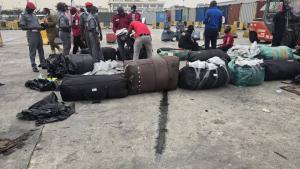
Customs
Comptroller Aliyu vows to sustain onslaught on smugglers as he assumes duties at FOU A

-
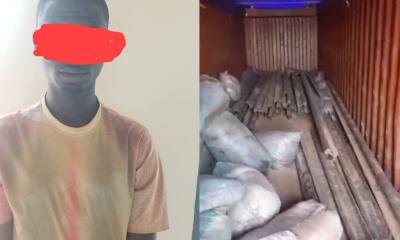
 Headlines2 months ago
Headlines2 months agoNRC police tracks down mastermind of railway vandalism in Kaduna
-
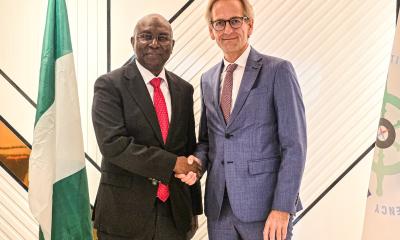
 Headlines2 months ago
Headlines2 months agoDenmark, Nigeria seek new areas of collaboration on maritime development
-

 Headlines4 weeks ago
Headlines4 weeks agoEx-NIWA boss, Oyebamiji, emerges most media-friendly CEO in maritime industry
-
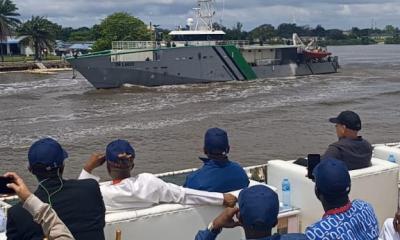
 Headlines3 months ago
Headlines3 months agoNigeria dazzles Dominguez, IMO scribe, with practical demonstration of deep blue assets capabilities.
-
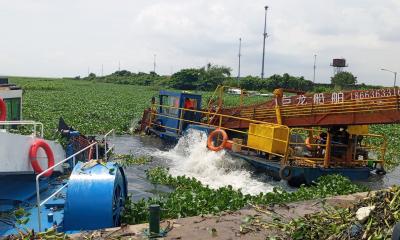
 Headlines2 months ago
Headlines2 months agoWater Hyacinth: An imported invasive aquatic menace NIWA is determined to fight in Nigeria
-
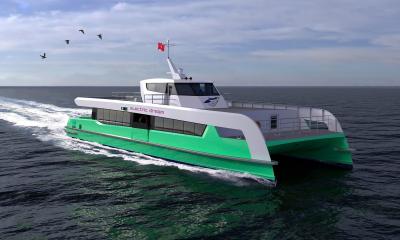
 Headlines3 months ago
Headlines3 months agoLagos government deploys 78 high-capacity electric ferries to kick- start launch of Omi Eko project

